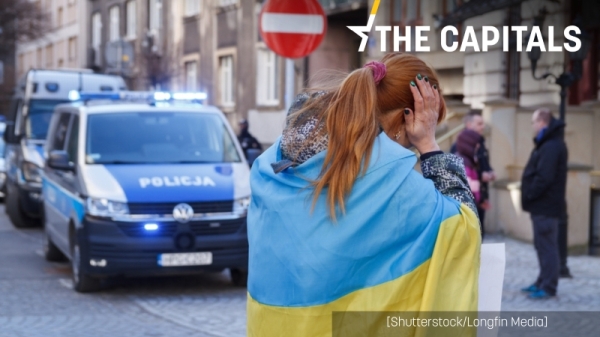Refugees return to Ukraine due to reproductive, sexual challenges

Ukrainian refugees are temporarily returning home to receive sexual and reproductive healthcare after finding their options limited in Hungary, Poland, Romania, and Slovakia, while others seek illegal solutions, according to a study published by the Centre for Reproductive Rights.
A study published on Tuesday, the work of nine international human rights organisations documents the alarming impact that restrictive national laws have on refugees seeking essential care and support.
The report’s findings are derived from over 80 semi-structured interviews conducted between July 2022 and April 2023. It found that Ukrainian refugees face detrimental delays, anxiety, fear, financial hardships, institutional racism, and inadequate care, all directly affecting their health and overall well-being.
The health and well-being of some refugees from Ukraine are at risk because of failures to guarantee access to essential and time-sensitive healthcare and support services, compounding the harm they have endured as a result of the invasion of Ukraine, the Centre Reproductive Rights’ Senior Regional Director for Europe, Leah Hoctor, told EURACTIV.
“The European Union has promised to provide refugees from Ukraine with sanctuary and care. Yet women from Ukraine […] often experience a very different reality when they need sexual and reproductive healthcare […] facing an obstacle course of restrictions, confusion, stigma and discrimination,” she added.
Matter of Polish law and anti-LGBTQ+ policies
Hungary, Poland, Romania and Slovakia have highly restrictive environments regarding reproductive health care and gender-based violence support services. The report found that women face legal restrictions, cost barriers, a lack of information and poor quality care when accessing such support.
Furthermore, women seeking reproductive care often face serious threats, harassment and intimidation in contexts where reproductive rights are not priorities for the state.
Poland is one of the most restrictive environments for sexual and reproductive health and rights in Europe. After the 2020 ruling by the country’s Constitutional Tribunal, abortion is only legal when the pregnancy results from a criminal act or when the woman’s life or health is at significant risk.
The fact that refugees from Ukraine in Poland are forced to return to Ukraine for abortion care or to access care in other parts of Europe is an indictment of Polish law and practice, said Krystyna Kacpura of the Polish Foundation for Women and Family Planning.
Most refugees in Poland seek abortion care outside of legal pathways by buying abortion medication online or travelling to other EU member states to access care. Some women postpone seeking sexual and reproductive healthcare for as long as possible.
But it is not just those seeking reproductive assistance that face obstacles. The report found that survivors of gender-based violence often go without essential services and support and are dealing with trauma, health concerns and other consequences on their own, while Roma and LGBTQ+ refugees face intersectional discrimination and increased barriers.
ILGA-Europe estimates Poland to be a country where the living conditions for LGBTQ+ are the worst in the EU. Also, several local governments adopted resolutions on ‘LGBT-ideology-free zones’.
Support services for survivors of sexual and gender-based violence in Poland are entirely inadequate, believes Joanna Piotrowska of Feminoteka Foundation, a Polish organisation participating in the study, adding that “many survivors find no safe haven where they can be supported in addressing the traumatic experiences they have endured.”
In Slovakia, Adriana Mesochoritisova from Freedom of Choice said there are not the necessary services in place to help Ukrainian women.
“Slovakia does not have the necessary services in place to respond to the needs of women from Ukraine. Whether it comes to abortion care, contraception services, gender-based violence support, so much is lacking. There are so many barriers in their way.”
In Hungary, it is the same story.
“Following the invasion, human rights organisations mobilised immediately to respond to the needs of refugees fleeing Ukraine,” said Erika Schmidt, EMMA Association, Hungary. “But, one year on, we and other organisations providing sexual and reproductive care continue to run up against major legal, financial and operational challenges that impact our ability to serve refugees.”
Meanwhile, in Romania, gender stereotypes and multiple forms of discrimination are causing problems for refugees, especially when combined with growing momentum against reproductive health freedom.
“Access to good quality healthcare and support services for women and girls in Romania. Vulnerable groups always have the hardest time navigating these stormy waters,” said Camelia Proca, A.L.E.G., Romania.
The full-scale Russian invasion of Ukraine has forced more than 8 million people — primarily women and children — to seek refuge in countries throughout Europe. Poland received the most refugees among the EU states.
Almost 12 million people have crossed the Ukrainian-Polish border since 24 February 2022, says Polish Border Guard. According to the government’s data, about a million Ukrainians are embraced with temporary protection in Poland.
(Aleksandra Krzysztoszek | EURACTIV.pl)
Read more with EURACTIV




